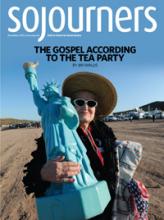I believe social justice activism is part and parcel of discipleship and living our faith -- we must apply lessons learned from previous social movements while also developing new tools and strategies to be effective change agents today. In my life and those of others, I've seen how we are called to build God's kingdom, motivated by "burning bush" moments when God commands our greatest attention and stretches our sense of what’s possible.
In July 2000, after a month of working alongside Zambian youth to strengthen HIV prevention programs, I arrived in Durban, South Africa, for the International AIDS Conference, which every two years helps to focus the world’s attention on the epidemic. The conference was taking place at the epicenter of the pandemic in South Africa's KwaZulu-Natal province.
During the opening plenary, Edwin Cameron gave an electrifying speech that felt like a "burning bush" moment. Cameron was a white South African judge who had gone public with his HIV-positive status at great risk to his career. He described to an audience of more than 10,000 researchers, doctors, public health workers, and activists how, less than three years prior to the conference, he had been on his deathbed. His voice ratcheted up a notch as he said, "My presence here embodies the injustice of AIDS because, on a continent in which 290 million Africans survive on less than $1 U.S. a day, I can afford medication costs of about $400 per month." Because of his wealth, skin color, and status, he could purchase antiretroviral drugs that literally brought him from the brink of death back to life. But AIDS still represented a brutal death sentence for the vast majority of the world, including the majority of his black South African brothers and sisters living with the virus. The moral failure of our increasingly globalized world hung in the air like a suffocating fog.
Read the Full Article

